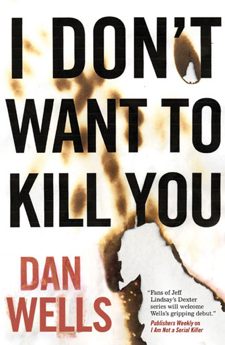I Don’t Want to Kill You is the third book in Dan Wells’s John Cleaver series. In the past I’ve reviewed the first two books of the series (I Am Not a Serial Killer and Mr. Monster, respectively), and to summarize, I enjoyed them rather a lot. Wells has an excellent grasp on the voice of his protagonist, teenage sociopath John Cleaver, and the books are unapologetically dark.
The third book opens with John reflecting on the suicide of a classmate, and how much it has upset him—more than he thought it would, certainly, since he wasn’t hugely bothered by the other deaths he witnessed in person throughout the past two books.
Huge spoilers below.
I was excited to get my hands on a copy of this book. As I’ve said, the first two were great. Gripping, uncomfortable, vivid; they didn’t pull their punches. Mr. Monster was darker by a large measure and it showed John going down what I had thought was an irreversible path. He was reveling in his desires and the thrill of the hunt, he was struggling to channel his needs into an acceptable venue (i.e., killing only monsters), and the book was filled with some very hackle-raising murder fantasies.
Considering all of that, and the pattern that the first two books had seemingly put forth—dark to darker, theoretically to darkest in the third—I was thrown off by I Don’t Want to Kill You. It takes a step back from the downward spiral of Mr. Monster. Not only that, it ends in redemption and, bizarrely, what I can only describe as “happily ever after” despite the death of two central characters.
I didn’t believe it.
The book is well written and engaging, make no mistake; John’s voice is as sharp and interesting as always. I read it in nearly one sitting. The interweaving mystery plots race along at a good clip throughout the book, drawing the reader along with them. Structurally, there’s nothing wrong with I Don’t Want to Kill You. It’s a perfectly functional, fun read.
The problem is that it doesn’t feel like the book that should have followed Mr. Monster. My suspension of disbelief shattered somewhere around the last third of the book; it seemed as if John had been retconned back to I Am Not a Serial Killer—and I simply could not believe that he just bounced back from the point where he ended in the second book. In I Don’t Want to Kill You, he turns into a relatively normal sort-of sociopath who isn’t constantly thinking about killing his girlfriend, for no reason that I can figure out aside from it making for easier storytelling.
Aside from that issue, I was hardly convinced by the pat-fix ending with the FBI agent or that John and Brooke ended up together in the end despite it all. The book’s final scene, with John discovering that maybe he had been in love after all, didn’t resonate with me, either. So by the final page, we have John discovering that he Has Feelings Too, an FBI team who will work with him and his “I-stalked-her-for-awhile-and-then-scared-her-out-of-dating-me” maybe-girlfriend Brooke to hunt monsters, and as such what amounts to an invitation to keep monster-killing to satisfy his baser urges. (A thought: what makes the Dexter series work so well is that there’s no legitimating of the serial killer through official channels and no attempt to redeem him through the power of love, at least in the books.)
It also didn’t help that I called the mystery from more or less the second page. By halfway through the book, I had gone from thinking “oh, please figure it out,” at John to “seriously, how have you not figured this out?” By the time the climactic ending battle had rolled around, I was so sure of what was going to happen—and it did—that it lacked any emotional impact.
Perhaps I’m being too harsh, but redemption is a hard trick to pull off in fiction, exponentially moreso when your lead character is a sociopath and a budding serial killer. I had higher hopes for a third book that followed through with the discomfort and the darkness of the second instead of finagling a “happy” ending out of it all. Pushing redemption and happy endings is the predictable way to go instead of the daring possibility of having the main character caught, or dead, or what have you.
There’s nothing necessarily wrong with this book, but as the third in a series, it should feel more like it follows what came before it. If it was a standalone, possibly I would have been sold on the ending. Possibly. As it stands, I wasn’t. Wells is a talented writer but this book did not work for me.
Lee Mandelo is a multi-fandom geek with a special love for comics and queer literature. She can be found on Twitter and Livejournal.










